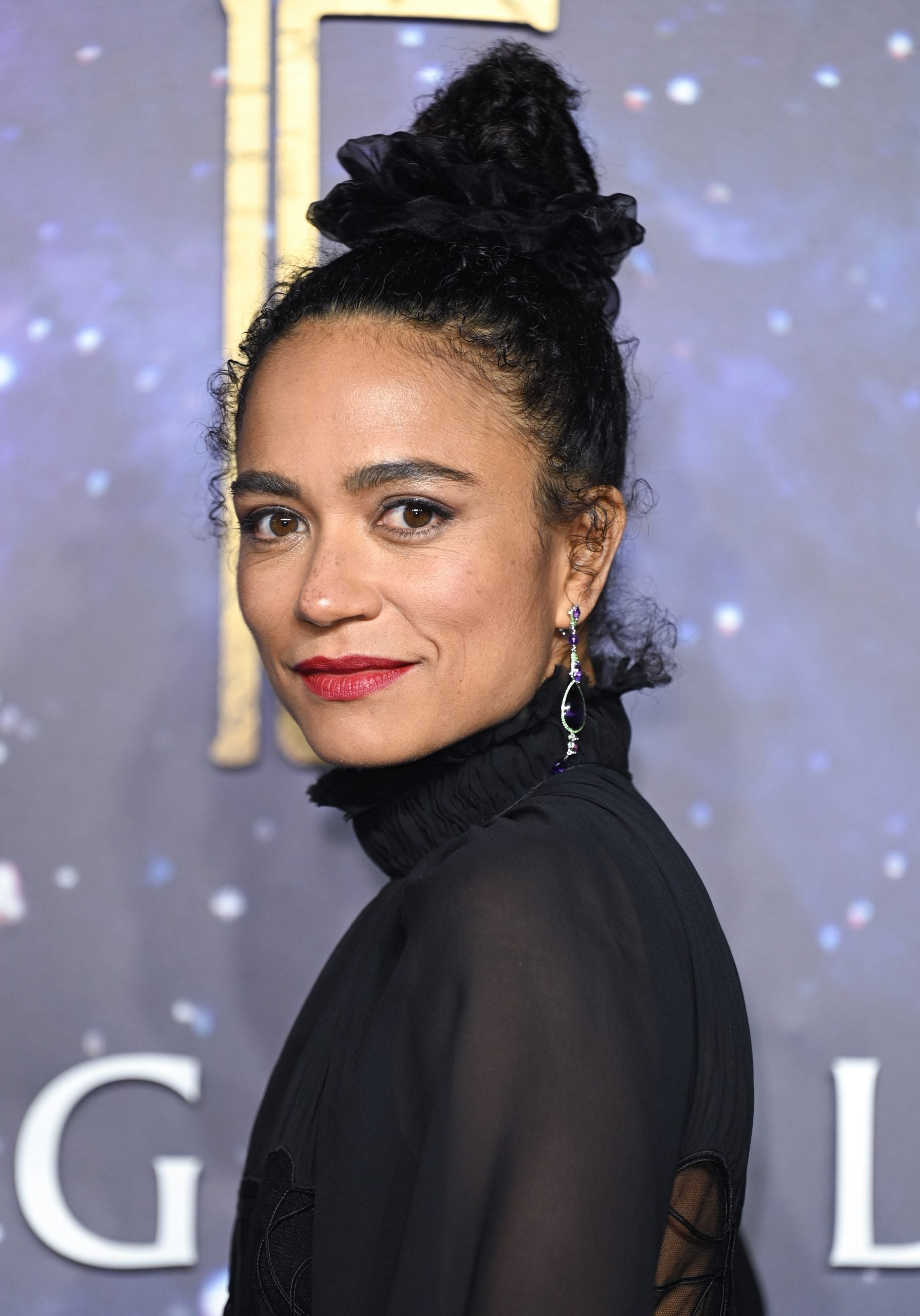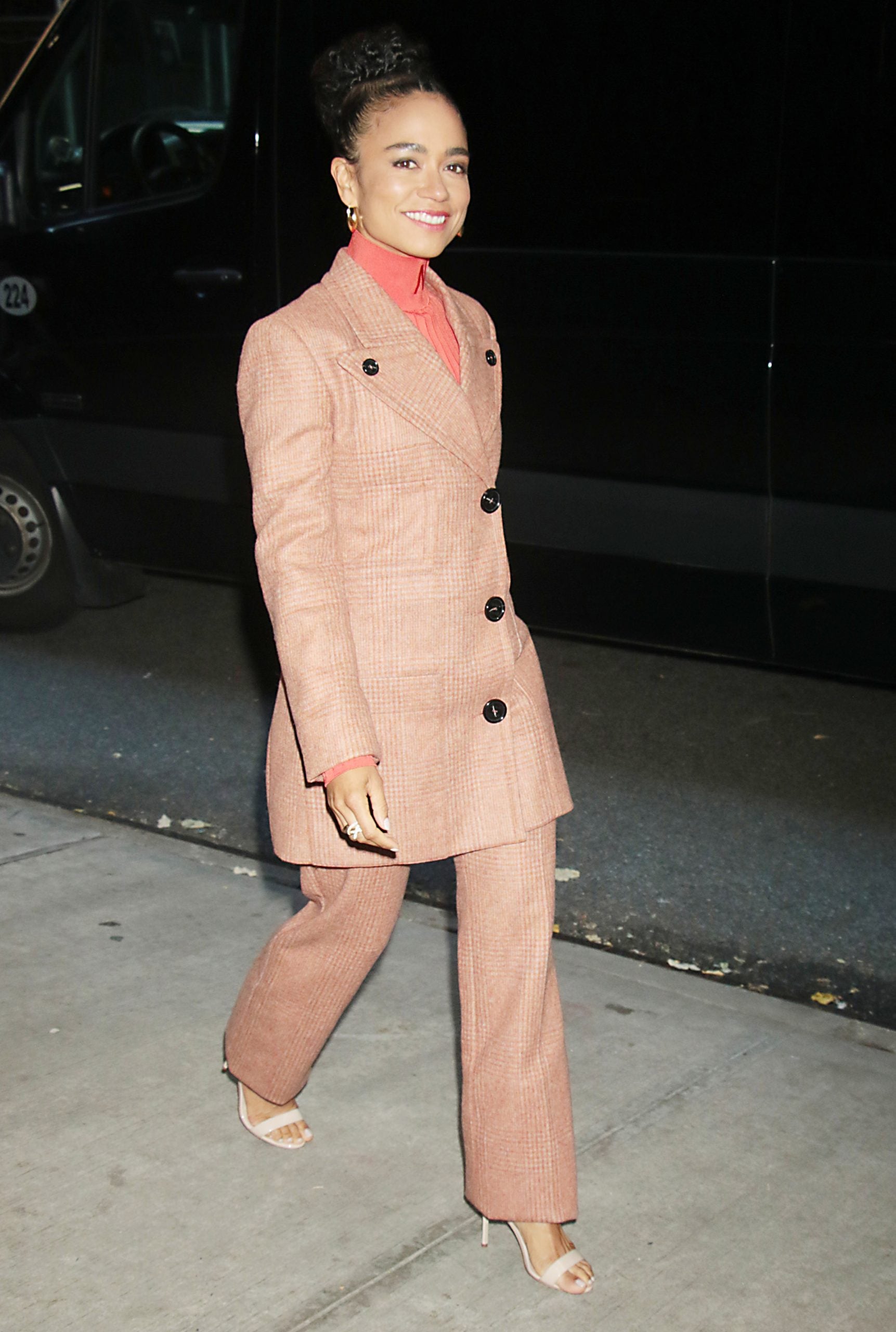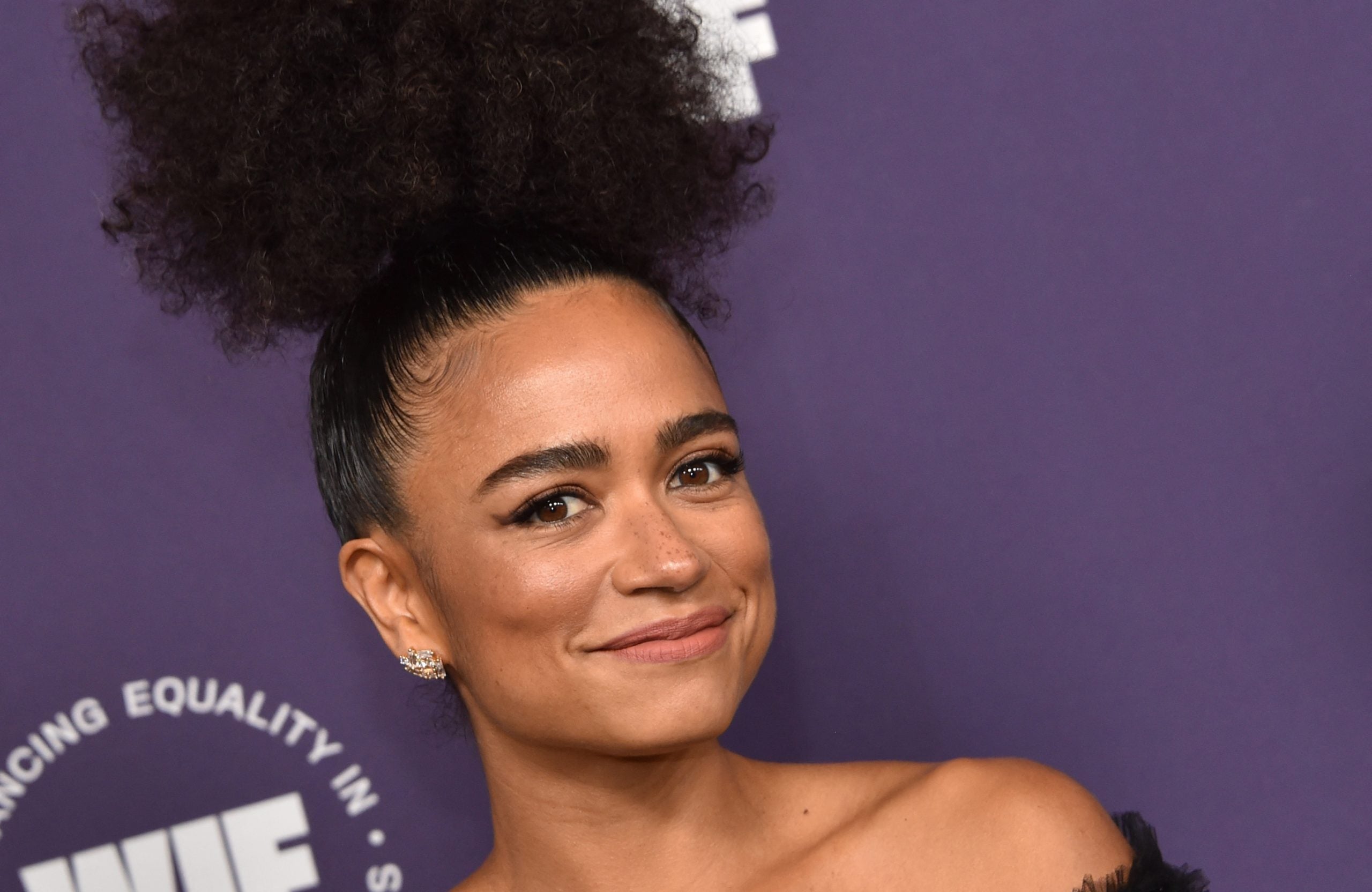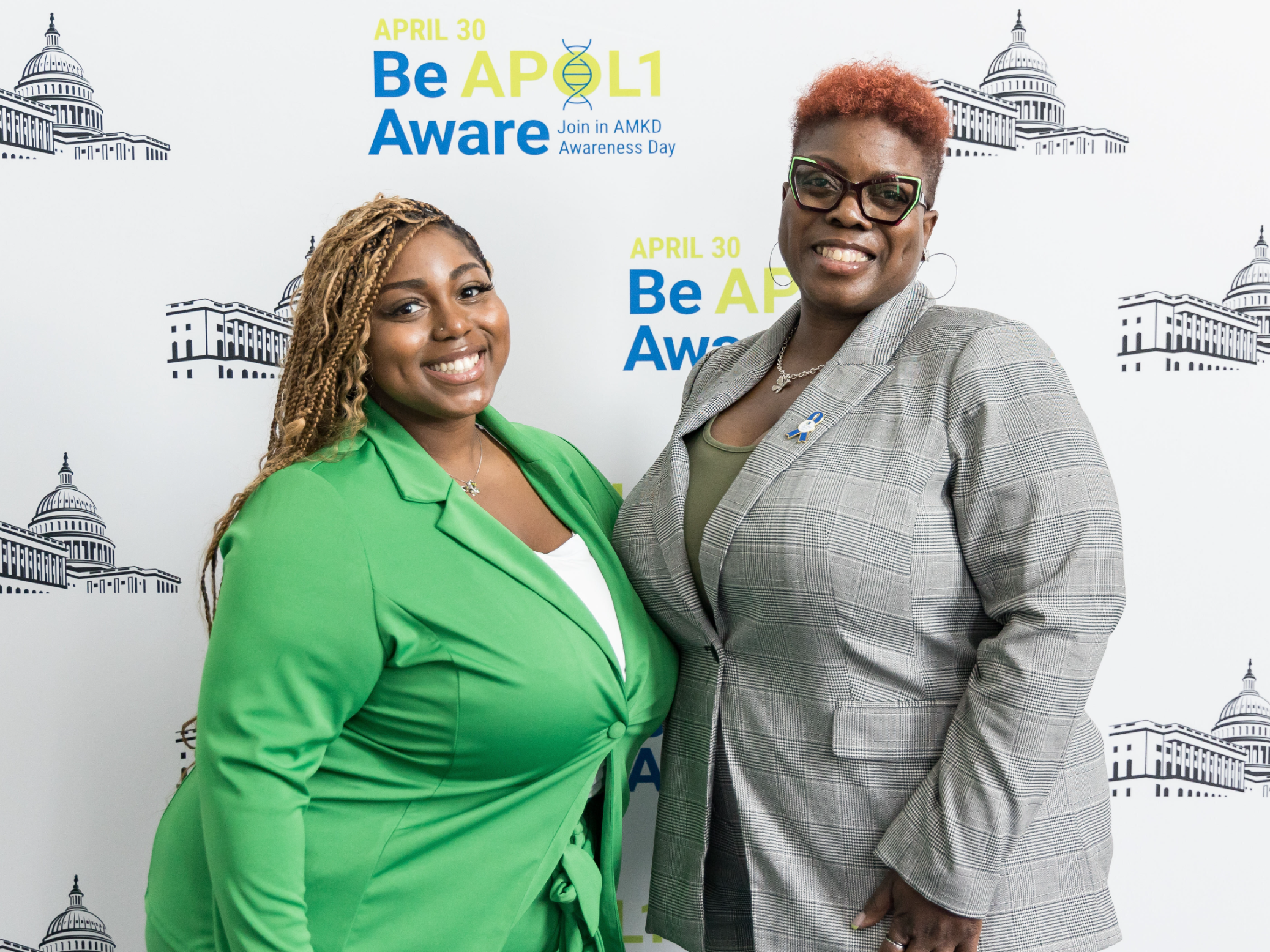Many women make huge, life-altering career changes years into their chosen profession. But Lauren Ridloff’s unexpected career pivot has led her to become a ceiling-shattering superhero in a groundbreaking big studio film.
The Chicago native snagged a co-leading role in Eternals, the highly-anticipated 26th entry into Disney’s Marvel Cinematic Universe. The film is a sweeping, canon-expanding addition to the fan-beloved lore originated by The Avengers, and features the largest, most diverse cast in an MCU film so far. Not to mention, she has made history as the first deaf superhero in the franchise’s multi-platformed history.
The 43-year-old actress, whose intensely youthful looks belie her years, portrays Makkari, a snarky yet compassionate otherworldly immortal being who has occupied Earth for 7 centuries. A member of a family of 9-other such beings who answer to a grand celestial power, she possesses the power of speed that sees her traversing the world’s expanse in a manner of minutes.
Despite landing this massive role in such a groundbreaking capacity, Ridloff is still a relative newcomer to the film world. She also had quite an unconventional entry into acting.
“I was a kindergarten teacher for almost 10 years,” she said. “I definitely enjoyed it and I loved my classroom.”
Holding an MEd from NYC’s Hunter College, she taught a group of about 15 students with varying proximity to the deaf community in American Sign Language at Manhattan’s P.S. 347. She was brought on for a consulting role for a 2018 revival of the classic play Children of a Lesser God on Broadway but ended up doing a table read and eventually snagging the lead role opposite Joshua Jackson.
Though she had little acting experience, Ridloff’s moving performance garnered her a Tony nomination that same year.
“It was during that time that I realized, ‘wait a minute, I’m still doing the same thing,’” she said of her newfound success on the stage. “I am still teaching. My classroom though, just got a lot bigger into a thousand-seat auditorium as opposed to 15, but just as diverse.”

She was able to parlay that stint on the stage into an appearance in the Academy Award-nominated film The Sound of Metal and a recurring role on AMC’s The Walking Dead. Now, with only a few credits under her belt, she’s starring alongside Angelina Jolie, Salma Hayek, and Brian Tyree Henry among others in a Marvel film from Academy Award-winning director Chloé Zhao.
“I do feel so fortunate and lucky enough to work with a director who actually came from a similar background as me,” she said. “You have a director in Chloé, who’s a woman of color, and she has directed independent films thus far. I feel like she brought that same kind of intimacy that she has with actors. This is a huge cast of 10 Eternals and [we’re working with] A-listers, vets in this industry, but I feel Chloé treated all of us as equals.”
Ridloff’s role in the film sees her occupying a space that originally wasn’t even written for a woman, a person of color, nor a member of the non-hearing community. This gave Zhao and Ridloff the opportunity to revolutionize the role and build her character from scratch.
“We completely flipped Makkari from who they were in the original comic books. It was a white man, hearing, and they switched it to somebody completely different, which meant that we had creative freedom to collaborate with Chloé and be a part of her vision of who Makkari was going to be.”
Zhao chose to select traits from Ridloff herself to fold into the character, giving Makkari a level of authenticity to the actress’ own experience.
“That conversation shifted more to who I was as a person. Chloé was really interested in finding out who Lauren was,” she said, noting that she and Zhao share a love for running (Ridloff has been a runner since high school) and for reading that became integral character traits for Makkari. This also allowed Ridloff to flaunt her running prowess on-screen instead of using a stuntwoman or stand-in.
“I was so proud to be able to do a lot of my own stunts at this point in life. I’m 43 years old and I felt like I was at the peak of shape that I was at that point.”

Naturally, Ridloff is still a bit shocked at the sudden turn her life has taken after starting off in the classroom. Surprisingly, a chance trip to a local psychic previewed her reaching this level of worldwide recognition, though she didn’t put much stock into the information at the time.
“I didn’t even dream of [being in a Marvel film] or even becoming an actor, because I just never dreamed that I would be playing a superhero. No way,” she says of this unexpected turn of events. She notes that her main dream growing up was to be a writer of children’s books.
“Years and years later I was convinced to actually go and have a sit down with a psychic and I thought, ‘Oh, this isn’t exactly my thing.’ But my friend was so excited and said, ‘this is going to be worth it!’ So we did. We sat down with the psychic. And she predicted that something like this would happen.”
In a time where there are very few roles for the non-hearing, much less non-hearing women of color, Ridloff’s success seems even more unlikely than she thought that day seated in the psychic’s chair. However, she has etched out a space in Hollywood that paves a pathway for those coming behind her. She believes that audiences are beyond ready to see more content featuring characters that reflect their own realities.
“I think Shonda Rhimes, has said that TV and film out there needs to look more like the real world,” she said, noting that she’s thankful to the producer for publically making that push. “Now audiences are smarter, I think they’re more global. I think that it’s more visual and they’re more open to new stories.”
As a Black, Latinx, and deaf woman, and a mother to two deaf sons of her own, Ridloff is happy to have the chance to provide young people who have never seen someone like themselves on the big screen – much less on an IMAX screen, as a powerful superhero – the validating representation she wasn’t always afforded growing up.

“I come from a biracial mixed family. I am Black and Mexican…I definitely struggled with that because of all those intersections of identity, what comes first?” she recalls of her youth. “What do I say first? And how do I even…what do I call myself?”
“Growing up, I really didn’t see enough of that on screen, so I definitely felt a little lost,” she explained. “I saw a deaf woman on the screen, but she was white. I saw a Black woman on the screen, but she was hearing. Where are the people that are just like me?”
Much as she was able to inspire and educate those 15 small children in Manhattan’s Lower East Side, Ridloff is hopeful that Black, brown, and non-hearing children all over the world can watch her zoom across the Earth, defeat violent monsters and evil forces, and exert superhuman strength all while using sign language in a body of color and be inspired. Inspired to be proud of whatever intersection of identity they occupy, and to use their voice to express that.
“I hope that children will be able to see the movie and also relate. And I hope also that children will see me using my platform as the first deaf superhero, and also learn how to share their own narratives, their own different identities.”








